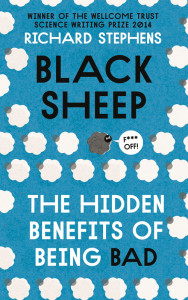Hachette Australia
July 2015
 Unfortunately, Black Sheep: The Hidden Benefits of Being Bad is a book entirely deserving of the shadowy mist of obscurity. It’s hard to think of another popular science book so disorganised. Richard Stephens is so enamoured to show us the hidden benefits of being bad, that he writes a book filled with flawed research, unsupported conclusions, referencing that wouldn’t get through a first year lab report, and dumbed down explanations of scientific concepts (“This is what we call replication”). No doubt he’s a man who can sell himself; it’s just a shame he seemingly can’t deliver. Being bad? ‘Bad’ has more than one meaning, and Richard Stephens may not have achieved the sort of bad he wanted to.
Unfortunately, Black Sheep: The Hidden Benefits of Being Bad is a book entirely deserving of the shadowy mist of obscurity. It’s hard to think of another popular science book so disorganised. Richard Stephens is so enamoured to show us the hidden benefits of being bad, that he writes a book filled with flawed research, unsupported conclusions, referencing that wouldn’t get through a first year lab report, and dumbed down explanations of scientific concepts (“This is what we call replication”). No doubt he’s a man who can sell himself; it’s just a shame he seemingly can’t deliver. Being bad? ‘Bad’ has more than one meaning, and Richard Stephens may not have achieved the sort of bad he wanted to.
On the surface, Black Sheep pulls us in with the promise of vice justified. There’s a certain cool factor associated with bad behaviour; it embodies defiant rule breaking in opposition to social norms that try to constrain and define us. By being bad we signpost our independence. After all, don’t we know that those who break the rules are ultimately the ones who change the world? There’s something seductive about the idea; that small, everyday bad behaviour is simply a precursor to wider participation in the great waves of social, organisational and technological change. Continue reading

